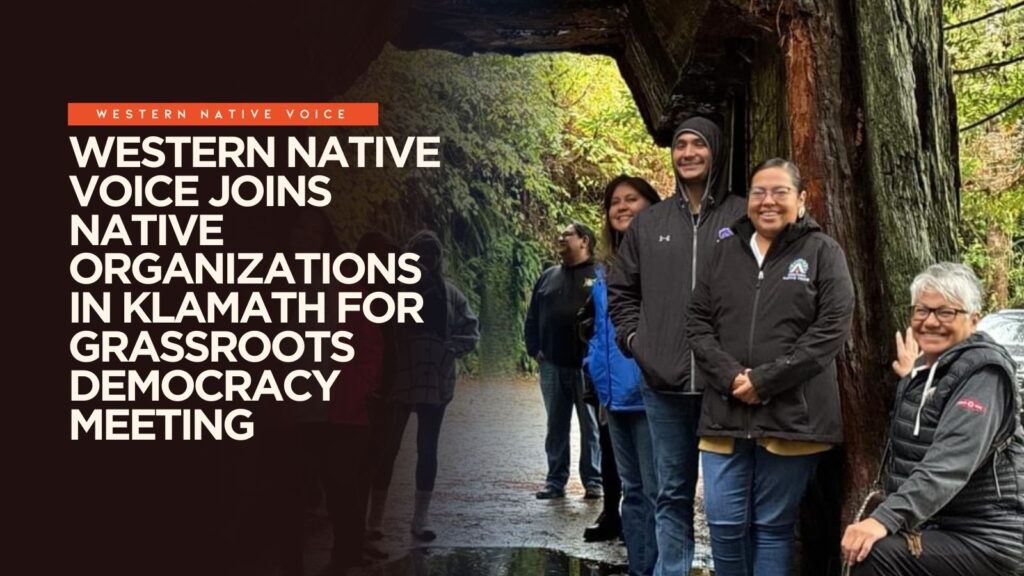
KLAMATH, Calif. — Native organizations from across the country, including Western Native Voice, gathered in Klamath, California, for the annual National Native Grassroots Democracy Project meeting. The event provided an opportunity to strategize, share tools, and strengthen efforts to amplify Native voices in democratic spaces. It also served as a debriefing session, allowing participants to reflect on the successes and challenges of the recent election cycle.
The meeting brought together a coalition of grassroots organizations dedicated to Native advocacy, including Native Vote South Dakota, Get Out the Native Vote (Alaska), North Dakota Native Vote, Indigenous Idaho Alliance, New Mexico Native Vote, Arizona Native Vote, and Western Native Voice.
Breaking Down Key Issues: Urban, Rural, and Youth Perspectives
The meeting was organized into three working groups—urban, rural, and youth—to address the unique challenges and opportunities facing different segments of Native communities.
In the urban group, participants discussed the growing need for outreach in metropolitan areas, where Native populations are often overlooked. Issues such as housing instability, lack of representation in local government, and the difficulties of maintaining cultural identity in urban settings were central topics. Strategies focused on connecting with Native populations through urban community centers, Native-focused events, and partnerships with schools and social service organizations. The group also highlighted the importance of addressing misinformation about voter rights and increasing access to voter registration through trusted community spaces.
The rural group focused on the barriers faced by reservation and rural Native communities, including geographic isolation, lack of transportation to polling locations, and limited access to reliable information about elections. Participants shared successful strategies, such as using trusted local messengers to deliver voter education materials, organizing rides to the polls, and leveraging community events to increase turnout. A recurring theme was the importance of ensuring that rural communities feel their votes matter, despite often being in areas where they are a small percentage of the overall electorate.
The youth group brought a forward-looking perspective, emphasizing the need to engage younger generations in civic life. Discussions centered on the challenges of youth disengagement, particularly among those who feel disconnected from political systems or are unaware of how voting impacts their communities. Participants explored ways to make voter outreach more engaging for young people, including using social media campaigns, hosting events focused on youth leadership, and incorporating civic education into cultural programming. The group also stressed the importance of mentoring programs to help young people see themselves as future leaders and advocates for their communities.
Reflecting on the Election
Beyond the breakout groups, the meeting served as a debriefing space to analyze the successes and challenges of the recent election cycle. Many organizations reported increased voter turnout in their communities but noted persistent barriers, such as voter ID laws, limited polling locations, and language accessibility issues.
Participants shared stories of innovative solutions, like mobile voter education campaigns and culturally tailored outreach events, that helped overcome these barriers. The discussions also highlighted how key issues like climate change, tribal sovereignty, and healthcare access motivated many Native voters to participate in the election.
Building a Unified Vision
The gathering underscored the importance of collective action to address these diverse challenges. By dividing into focus groups, participants were able to dig deeper into the unique needs of their communities while identifying shared goals that connect urban, rural, and youth populations.
Held in Klamath, a region with deep cultural and historical ties, the meeting reinforced the connection between grassroots advocacy and protecting Native traditions and sovereignty. Participants left with actionable plans and a renewed commitment to amplifying Native voices in shaping democratic processes.
Strengthening Grassroots Connections
The National Native Grassroots Democracy Project meeting remains a cornerstone for fostering collaboration and alignment among Native organizations. By addressing specific community needs and working collectively, attendees aim to strengthen the movement for Native representation and participation in civic life.
“This work isn’t easy,” one attendee remarked, “but by focusing on what makes each community unique while standing together, we can create lasting change.”










